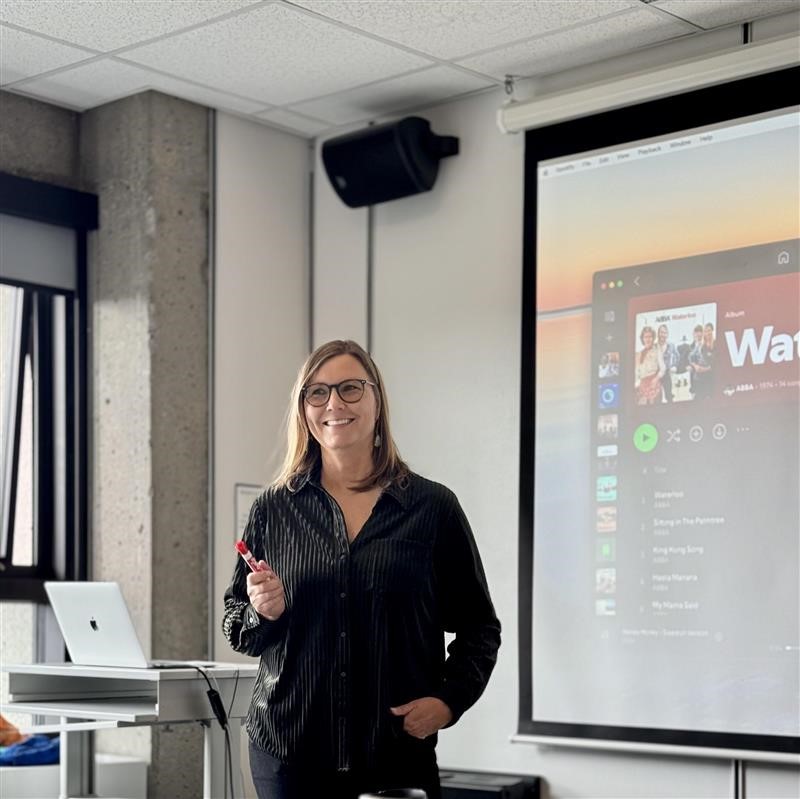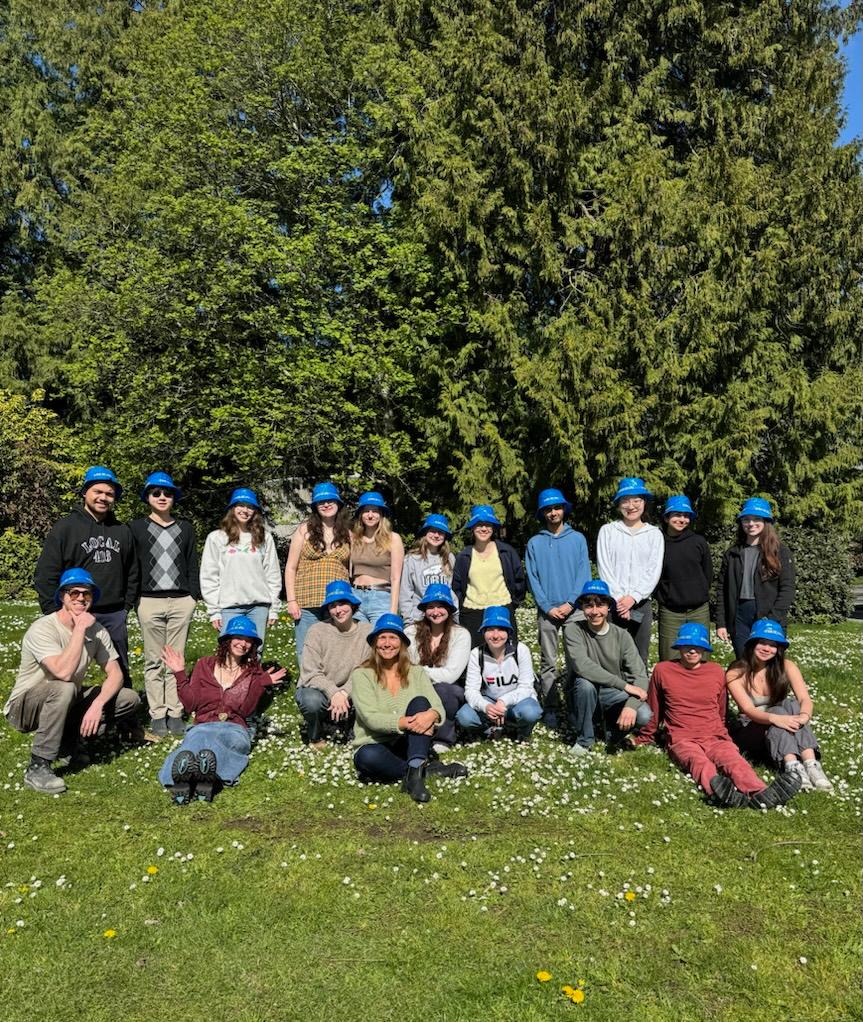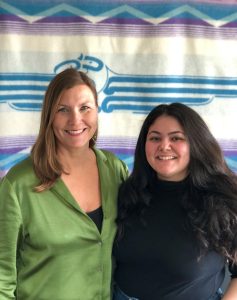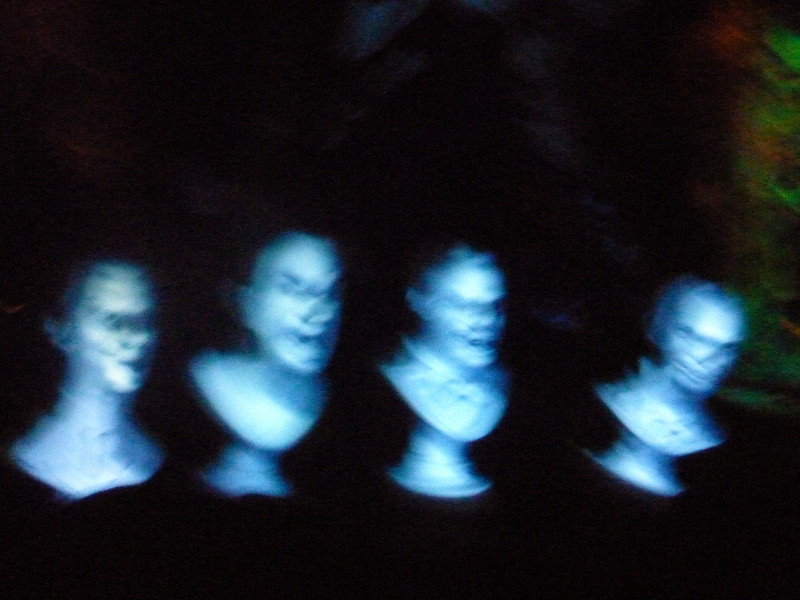

Written by Ashley Samsone (Nordic Minor alumni 23’), featuring other Nordic alumni friends.
“I’m going to learn everyone’s names within the first two weeks of class. I promise!”
That was one of the first things Lena Karlström said in my SWED 100 course. It was September 2017, I was just starting my second year at UBC, and like many of my peers, was so excited by the opportunity to learn Swedish. My friend had taken it with me, and together we sat third row as Lena introduced herself, and then started walking up to each individual in our 30-student beginner class.
“Hej,” she smiled when she reached me. “What’s your name? Why are you interested in taking Swedish?”
Now, I can see how this would be intimidating, but Lena was genuinely trying to put a name to a face and wanted to know why each of us chose Swedish.
“What really set Lena apart from other educators was the compassion, kindness, and love she radiated both inside and out the classroom. Taking a class with Lena felt like learning from a friend who wanted to see you succeed and someone who was honoured that you’d choose to spend time with them learning Swedish or about the Nordic region. Class was never dull and felt more like a conversation between you and her rather than a lecture between a professor and their students.” – Ikra Aziz, BA History Major, Nordic Studies Minor
Within those first two weeks of small talk, getting to know us (and encouraging us to get to know each other), Lena’s promise held true. She did remember every single student’s name. To her, making sure she knows how to pronounce names, showing that she sees you as an individual, not just part of a big group within the university, is important. One would think that being “chatty” in a course would be disruptive, but within the first two weeks Lena got the class knowing and talking to each other. By getting the language structure down early, running through the basics (usual language learning business), soon enough we were singing (albeit, terribly) Swedish songs. Rap, folk, and pop, every single Friday, along with Lena. Many of us looked forward to these days, not solely because of the weekend, but by having time to feel silly and open to this learning exercise.
A Brief History of UBC’s Nordic Program


Lena’s Swedish 210 class, sporting Ikea bucket hats, May 2024.
For those that have not had the pleasure of meeting Lena or taking one of her classes, she was the Nordic Program’s Swedish Lecturer in the Department of Central, Eastern, and Northern European Studies up until July 1, 2025.
If you’re not too familiar with the Nordic Program (or as we in CENES fondly like to call it, NORD), here is a brief history lesson, because to know the program’s current iteration is to know Lena: for decades, Nordic culture and languages have been taught at the University of British Columbia, building on a long-established seminar in old Norse that was part of the German Ph. D. program dating back to the 1970s when Swedish language courses were added to the curriculum. As a result of the rapidly growing interest in Nordic culture fostered by the Swedish language program, courses in Scandinavian literature in English translation soon joined.
Lena came to UBC in 1993, where she combined teaching with freelance travel journalism, developing and teaching several courses on Nordic crime fiction, literature, culture, and cinema (she has the best Nordic Noir recommendations). For several years, Lena had two sections of 30+ 1st-year students, which put our Swedish program on an equal footing with PhD-equipped Nordic Studies departments in the USA. In the late 1990s, while CENES was adding the Slavic and Eastern European Studies program to its roster, the university was approached by the Danish government about the possibility of establishing a Danish lectureship at UBC.
Geoffrey Winthrop-Young, previous department Head and one of the instructors of our Norse Mythology and Vikings courses, says that when the idea of CENES having a separate Scandinavian and Nordic section with its own program presented itself, its success was pushed by three things:
- Once CENES added Danish to the program, we had two Nordic languages, which justified the designation of the course code SCAN (the old course code for NORD). Having these differing course codes meant the program was growing and able to offer students enough credits to obtain a minor.
- CENES already had a Germanic and Slavic section, so why not add a Nordic section?
- The numbers were picking up, showing a vested interest in Nordic studies, for which we mainly have Lena to thank for.
With these reasonings and Lena’s concentrated efforts, the department’s Nordic colleagues were able to draft a program for a Nordic Minor (then called Scandinavian Studies), which became official in 2011.
Lena worked to broaden interest in this program, emphasizing that students do not have to be Swedish to take Swedish. She focused heavily on having a strong curriculum, being understanding and accommodating, and curating a space where students can bring their best selves to school. Community building was a big part of her time here at UBC (you can read more about Lena’s career in her interview with our Nordic Studies Work Learn). If you need an example, look no further than the Nordic program’s weekly Fika (afternoon coffee and social with various students and colleagues), which Lena started, and is one of CENES’ busiest and beloved events.
Why Lena Loved Teaching
If you’re wondering what Lena’s favourite part of teaching is, obviously, her students are at the top of the list. It’s true, you can ask her yourself, ask Reddit, or anyone in CENES. Good luck finding someone who doesn’t have a fond memory of taking her class, or who doesn’t have something nice to say about her character.
“It’s rare to feel genuinely cared for by a professor in university, but Lena’s extraordinary qualities truly engender the feeling of being taken under her wing; her sage advice, sharp wit and casual charisma have been a blessing to us all. Thanks to her mentorship and unwavering commitment to building community, the [Nordic] program has created a sense of belonging unparalleled across campus.” – Minori Kato-Hopkins, Scandinavian/Nordic Studies Minor, Class of 2019


Lena Karlström and Ashley Samsone, recipients of the CENES Mentorship Award 2023.
Lena never got the Sunday scaries. Since she started teaching Swedish, she has made it a point to acknowledge that she is thankful for her students. As a testament to her love of teaching and courses, Lena received the Killam Teaching prize, awarded to faculty members who have been nominated by students, colleagues, and alumni for their outstanding work. In 2023, Lena won the CENES Outstanding Mentorship Award. Her consistent efforts that have gone into supporting our language learning by building connections both inside and outside the classroom have been nothing short of valiant, having been one of the Nordic minors’ number one champion, no matter how many verbs we got wrong (and trust, we (I) got many wrong). She helped her students push back against systemic and institutional barriers, trying her best to make sure any student facing hardship had a safe space to learn and bring their best selves to class.
“I met Lena in my first year and she’s always been a sort of godmother of the Scandinavian and Nordic program. When she found out I was declaring a Nordic Minor, even though she was at the tail end of her time as program director, she proudly went around telling everyone that I was a Nordic Minor taking Danish instead of Swedish. Lena supported me even before I took one of her classes (Nordic Crime Fiction) and has always made an effort to connect with students personally through classes, fika, and the UBC Scandinavian and Nordic Student Association.” – Tyler Horman, BA Linguistics Major, Nordic Studies Minor
As students, we have those few instructors whose impact stays with us long after we leave their classroom. Lena encouraged us to speak the way we wanted to speak Swedish. Although she spoke with a Stockholm dialect, she emphasized that we didn’t have to talk the same way as her, and wanted us to bring our own personalities to the language she was sharing with us. When I first started learning Swedish, learning to let go of my inner perfectionist was one of the hardest lessons. The fear of being wrong was, sometimes, overwhelming – something that everyone can relate to. Lena also related to this, and having her encouragement to just try, to continue to learn and review, was the advice my peers and I obviously didn’t want (because we all want to be good at what we do), but desperately needed. Even though I learned this lesson in a language class, I apply this to almost everything I do.
Why you should continue to take Swedish, even though Lena is retiring
Another Nordic minor alum, Delaney Westby, shares my sentiment when it comes to talking about our experience with taking Swedish as a language at UBC. Lena’s legacy is that she made learning Swedish special, and even though she is retiring, I promise, there is still more to taking the class than just singing Swedish every Friday for two years. It’s about learning the culture.
“It’s about eating as well – pastries and tea and coffee at the department’s weekly fika, or Scandinavian treats that classmates make for their culture sharing projects every term. And it’s of course about learning Swedish – how to ask for directions, sing at the pub, swear, talk about bizarre Scandinavian habits, and anything else you could ever need to say to your Swedish friends.” – Delaney Westby, Nordic Minor, B.A 24’
In fact, if you’re a student wanting to take Swedish, Delaney provides a very in-depth account of what it’s like to be a SWED student.
Lena makes a consistent effort to remember all of her students, but we also remember her. As she was wrapping up and getting ready to retire, past students from a few years to nearly a decade back were contacting her to wish her well, all of whom still had strong memories of their time in Swedish class.
From all of us, tack så mycket (thank you very much) Lena, for building a community that has deep roots, and for believing in us every day. We wish you well on your retirement and this next chapter of your life, and we look forward to welcoming you back for fika, Lucia, and many more big moments.


